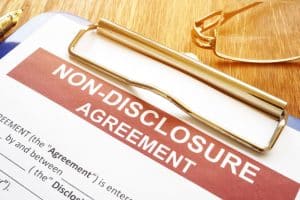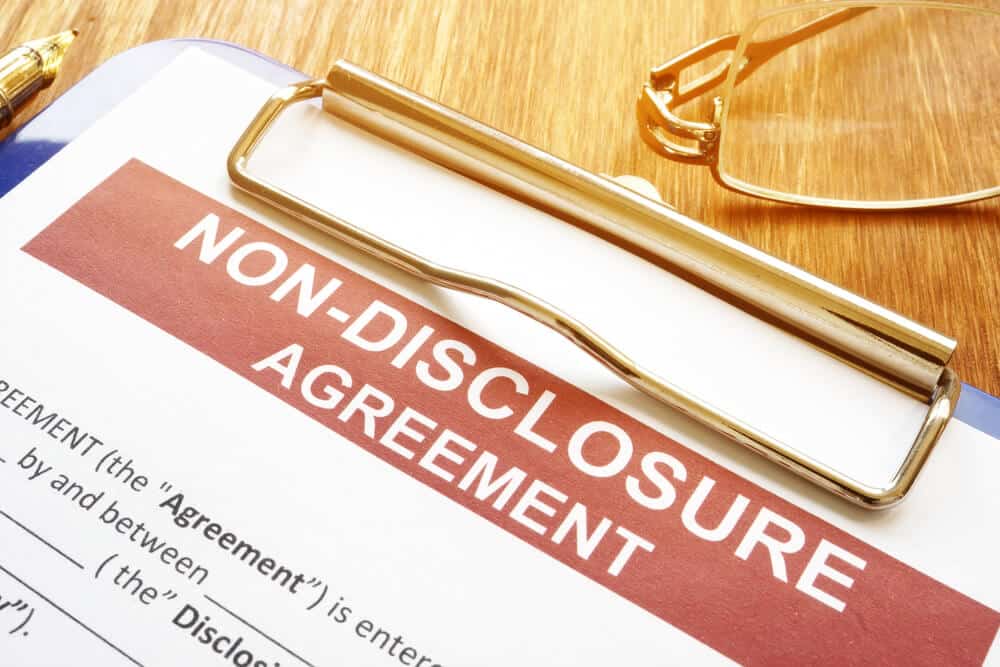Meaningful Information You Need to Know to Protect Your Privacy in Divorce
An Experienced Family Lawyer Can Help You Draft a Solid Non-Disclosure Agreement in New Jersey

With so much about your life open for public inspection and consumption during a divorce, it is important to understand the role of a non-disclosure agreement, weigh the benefits for your unique situation, and know how to make sure your NDA is solid and comprehensive from a legal standpoint.
Non-Disclosure Agreements “NDAs” in a Divorce Context in New Jersey
A non-disclosure agreement is a contract that the parties agree to abide by regarding private information and public exposure. It may contain clauses prohibiting each party from publicly criticizing or exposing personal behaviors and facts. In the divorce context, a non-disclosure agreement (NDA) may also include non-disparagement clauses that forbid a party to bad-mouth the other on social media or in other public spaces.
Like a prenuptial agreement, the NDA can be a planning tool to anticipate protections each party may need in divorce. For example, a famous politician, businessperson, or actor may fear a hostile divorce will harm their reputation. An angry spouse bent on destroying the other might publicly reveal nasty habits or behaviors that would tarnish the other spouse’s reputation. And when that reputation means obtaining or losing work, like a movie star, spiteful malignment could mean monetary loss and a destroyed career.
For example, the public would love to know that a celebrity known for their macho persona keeps their childhood teddy bear in their room for comfort. While seemingly harmless, the social media machinery could have a field day with private details that could tarnish someone’s reputation. An NDA is a forward-looking tool to prevent bad social media and press reviews should the parties break up. However, the NDA is not just for the wealthy and famous. Anyone can face ruin when an ex-spouse or estranged spouse sets out to reveal dirty secrets.
Clauses Included in a Non-Disclosure Agreement
If an NDA is necessary, couples contemplating marriage, already married, or divorcing can enter an NDA. Young couples marrying in the social media age could foresee a divorce getting nasty and becoming a public fight. They may want an NDA expressly forbidding social media wars. Even those in a marriage already with one or both spouses using social media as venting spaces could enter into a postnuptial agreement. In divorce, they may be part of a marital settlement agreement. Divorcing couples may want to protect their reputations and their children. Thus, the NDA terms may prohibit the publication of details about their children without permission.
The NDA may also prevent each spouse from posting information about immediate or extended family members. Other terms may include non-disparagement rules, like prohibiting negative social media posts about the other spouse or private marital matters, such as finances or employment details. Clauses forbidding each party to publicly disclose embarrassing or compromising information, such as past or present criminal or civil legal matters. And for celebrities and other famous people, an NDA may ban press or media contact by one spouse against the other. However, an NDA must also balance each spouse’s legal rights, such as seeking protection when domestic violence or child abuse occurs. In other words, the NDA terms must be legal and not contrary to public policy. Otherwise, one illegal term threatens to invalidate the entire agreement.
The Role of Social Media in Non-Disclosure Agreements
Like Facebook and Instagram, social media are prime sources of tell-all diaries. When you’re upset with your ex and tell it on Facebook or post degrading photos on Instagram, you risk harming your spouse. For example, a woman can rant on Facebook about how her husband gets drunk every night and terrorizes her and the kids, and before you know it, his employer wants an explanation. A police officer, CEO, or other person entrusted with public safety and personal financial protection can lose their jobs over disparaging social media posts. Likewise, a woman shamed and ridiculed by her husband on social media could suffer cyber-harassment and embarrassment, jeopardizing her community standing and employment. Social media rants can also affect divorce proceedings and harm children. Bearing this in mind, some choose to utilize the non-disclosure agreement as a mechanism for maintaining confidentiality in the digital age.
Cases in Which an NDA May Not be Necessary
For some people, an NDA is not necessary. Their jobs are not those that they could lose by poor public perception. Some people have little to lose with their private lives on display, no reputation that needs to be clean or businesses to protect. They have no children to fight over or criminal records to keep secret, and the divorce, if there is one, is anticipated to be amicable. Perhaps both parties respect privacy and so are not the types to air dirty laundry on social media. Some people don’t use social media. Those married couples may not feel the need for an NDA going into marriage or somewhere along the road in their marriage.
 Non-Disclosure Agreement Enforceability in NJ Marital Cases
Non-Disclosure Agreement Enforceability in NJ Marital Cases
New Jersey honors NDAs in contemplation of marriage that are not against public policy (N.J.S.A. 37:2-34(h)), and the parties fully disclosed all relevant details affecting the agreement. All NDAs must be legally enforceable contracts and specific. All contracts, including NDAs, must be between two willing parties who can enter into contracts. Since contracts are voluntary meetings of the mind, those who exercise undue influence over another or commit fraud to get the other spouse to sign an NDA cannot expect to enforce their agreement. Fraud and undue influence invalidate a contract. Not disclosing important facts or the incapacity of a party to the agreement also invalidate it. Minors and those mentally impaired or otherwise incompetent to understand the nature of a contract may not legally enter an NDA.
Contact our Family and Divorce Lawyers for Help Preparing Your Non-Disclosure Agreement in Toms River, NJ
To ensure your NDA is enforceable, choose a family lawyer with experience handling NDAs to draft one for your specific situation and needs. You want to make sure that the terms are not vague, contrary to public policy, or are so one-sided that a judge would throw them out. Also, you want to make sure that the terms are fully legal so you are not infringing on your spouse’s First Amendment rights to free speech or other legal rights.
An experienced family law attorney at Bronzino Law Firm knows what can and cannot be included in an NDA to ensure its legitimacy. Our divorce and family lawyers have vast experience handling non-disclosure agreement drafting, reviews, negotiations, enforcement, and all aspects of NDA’s on behalf of clients in Neptune, Toms River, Brick, Freehold, Middletown, Red Bank, Rumson, Wall, Holmdel, Sea Girt, and throughout Ocean and Monmouth County. Consult with a reputable family lawyer at our firm who cares about doing the best possible job for your NDA needs.
We can assist you immediately by calling (732) 812-3102 or requesting a free consultation online.


 Non-Disclosure Agreement Enforceability in NJ Marital Cases
Non-Disclosure Agreement Enforceability in NJ Marital Cases




